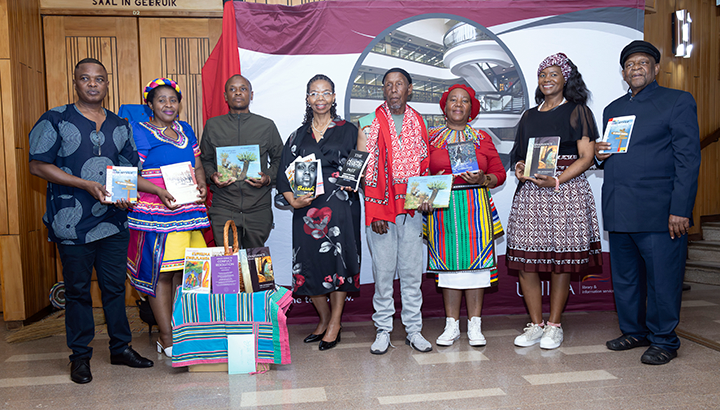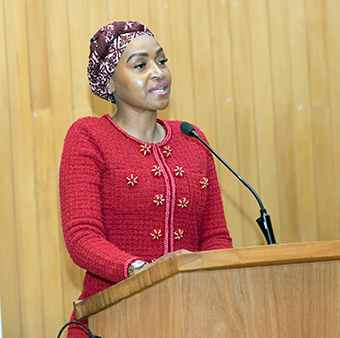

From left: Tsepo Constable, Dr Khomotso Marumo, Phinda Riba, Segametsi Molawa, Dr Cebisa Mabena, Dr Mabel Mahlalehlomile Mabena, Adv Helen Mamogamuru Mahlangu, and Prof Mathole Motshekga
Unisa Library and Information Services hosted a groundbreaking and thought-provoking workshop on 9 and 10 September 2025 at the Senate Hall, Main Campus, under the theme “The rise of artificial intelligence (AI) vs African/ancestral intelligence (AI): a discussion”.
The event brought together leading academics, spiritual practitioners and researchers to explore the intersection of modern artificial intelligence and traditional African wisdom systems. It provided a dynamic platform to reflect on how technology and ancestral knowledge can coexist and complement each other in shaping the future of humanity.
The programme opened with welcoming remarks from Dr Kgomotso Marumo, Director of Unisa Library and Information Services, who set an inspiring tone for the discussions. She reflected on the rapid transformation brought about by technology – its power to reshape industries, redefine university policies, repurpose libraries, and reimagine what it means to be human.
Marumo reminded the audience of another powerful force: the enduring foundation of African ancestral intelligence – a living legacy rooted in communal wisdom, spiritual insight, ecological harmony and intuitive knowledge passed down through generations.
Professor Zetu Cakata delivered an insightful presentation titled “Whose intelligence is artificial intelligence?”, raising critical questions about ownership, inclusivity and ethics in the development of AI systems. Dr Anisha Jogi followed with “AI and copyright”, examining the legal and moral implications of machine-generated content in the digital era. She emphasised the importance of protecting intellectual property and fostering responsible technological innovation.

Makgofe Moagi-Mazibuko
Makgofe Moagi-Mazibuko, South African actress, presenter, model and philanthropist, captivated attendees with her talk, “Echoes of the ancestors: weaving ancient African wisdom into the fabric of human-AI synergy”. She highlighted the importance of grounding modern innovation in ancestral perspectives to preserve cultural values and human connection.
Expanding on the theme of ethical development, Professor Wakanyi Hoffman discussed Ubuntu as a form of relational intelligence, illustrating how principles of interconnectedness and communal harmony can guide the development of AI systems.
Sinethemba Buthelezi (Gogo Nkunzebomvu) delivered an inspiring presentation titled “African spiritual intelligence: decolonising ancestral science in the age of AI”. She underscored the need to reclaim indigenous knowledge systems within scientific and technological spaces to ensure African voices remain central in global innovation.
Further enriching the dialogue, Busisiwe Madikizela-Theu, lecturer and researcher in social work at Nelson Mandela University and PhD scholar at the University of Fort Hare, delivered a presentation titled “Hybrid intelligence: designing artificial intelligence informed by African/ancestral knowledge systems”. She explored how blending modern innovation with ancestral wisdom can lead to more inclusive and culturally relevant technologies.
Professor Mary Reynolds Thompson examined whether AI poses a threat to Africa’s deep-rooted creativity. At the same time, Professor Mathole Motshekga concluded the workshop with his presentation, “The dynamic and complementary nature of African and artificial intelligence”. He emphasised collaboration rather than competition between these two forms of intelligence, advocating for a holistic approach to human and technological development.
The question-and-answer session allowed participants to reflect on the workshop’s central message: Africa’s ancestral wisdom and global technological innovation can coexist harmoniously to build a more inclusive, ethical and spiritually grounded future.
The workshop served as a powerful platform for bridging traditional African epistemologies with modern technological paradigms. Through critical dialogue, reflection and collaboration, Unisa Library and Information Services reaffirmed its commitment to advancing culturally grounded, future-oriented academic discourse.
* By Moditsa Masela, Marketing and Communication Intern, Library and Information Services
0 Comments.